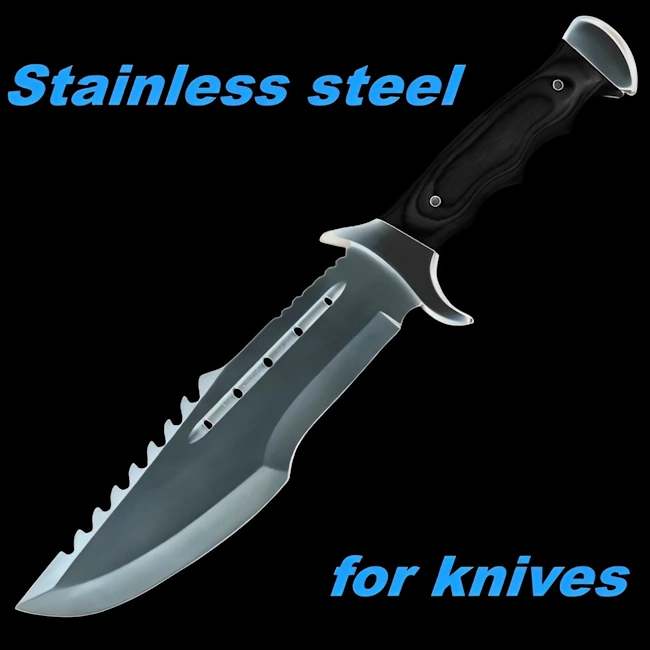Physical properties of stainless steel for knives, blades
The physical properties of stainless steel for knives are determined by three critically important characteristics that ensure a balance between the cutting qualities and the durability of the blade: corrosion resistance, wear resistance, and toughness (ductility/impact resistance).
1. Corrosion resistance
This is the steel's ability to resist rusting and oxidation from moisture, salt, and acids. This is the defining advantage of "stainless" steel over carbon steels. The resistance is provided by a high content of Chromium (Cr) (minimum 11.5%), which forms a protective passive film on the blade's surface. This property is critical for kitchen, fishing and diving knives, but it has a compromise: an excess of Carbon (C) can bind chromium into carbides, reducing the effectiveness of the protective film.
2. Wear resistance
Wear resistance is the steel's resistance to abrasive wear during cutting. It directly influences the duration of edge retention. This index is achieved thanks to the presence of hard carbides in the metallic matrix. These carbides are formed with the help of alloying elements such as Carbon (C), Vanadium (V), Chromium (Cr), and Molybdenum (Mo). Knives with high wear resistance are ideal for intensive work with hard or fibrous materials, as they require significantly less frequent sharpening.
3. Toughness / impact resistance
Toughness is the material's ability to absorb impact energy without fracturing, i.e., its resistance to chipping, cracking, and breaking. High toughness is necessary for survival, tactical and large knives used for chopping or subjected to strong lateral loads. This property is opposite to hardness: the higher the blade's hardness (especially ≥62 HRC), the more brittle it is. Modern powdered steels partially solve this problem, providing high hardness with an acceptable level of toughness thanks to the uniform distribution of micro-carbides.
| Physical properties | ||||
| Grade | Density Kg/dm³ | Thermal conductivity W/(m.K) | Specific heat capacity J/(kg.K) | The modulus of elasticity is 10³N/mm² |
| M398 | 7.46 | 15.2 | 490 | 231 |
| M390 | 7.54 | 16.5 | 480 | 227 |
| N695 | 7.70 | 15.0 | 430 | 215 |
| N690 | 7.70 | 15.0 | 430 | 223 |
| N685 | 7.70 | 15.0 | 430 | 215 |
| CTS BD1 | 7.65 | - | 460 | - |
| CTS BD1N | 7.75 | - | - | - |
| CTS 204P | 7.61 | 14.0 | - | 214 |
| CTS XHP | 7.62 | - | - | - |
| Vanax SuperClean | 7.56 | - | 490 | 220 |
| Elmax | 7.60 | 15.2 | 460 | 230 |
| CPM MagnaMax | - | - | - | - |
| CPM MagnaCut | 7.76 | - | - | 215 |
| CPM MPL-1 | - | - | - | - |
| CPM S125V | 7.31 | - | - | 221 |
| CPM S110V | - | - | - | - |
| CPM S90V | 7.40 | - | - | 215 |
| CPM S60V | - | - | - | - |
| CPM S45VN | 7.47 | - | - | 221 |
| CPM S35VN | 7.47 | - | - | 221 |
| CPM S30V | 7.47 | - | - | 221 |
| CPM 20CV | 7.62 | - | - | 214 |
| CPM 154 (154 CM) | 7.78 | 15.0 | 430 | 207 |
| CPM D2 | 7.78 | - | - | 207 |
| RWL-34 | 7.80 | 15.0 | 460 | 200 |
| SG2 | - | - | - | - |
| SPG STRIX | - | - | - | - |
| VG-10 | - | - | - | - |
| VG-10W | - | - | - | - |
| ZDP-189 | - | - | - | - |
| ATS-34 | - | - | - | - |
| ATS-55 | - | - | - | - |
| AUS-8 | - | - | - | - |
| AUS-10A | - | - | - | - |
| AISI 440C | 7.70 | 15.0 | 430 | 200 |
| MA5 | 7.7 | - | 460 | 215 |
| Nitro-V | - | - | - | - |
| PMD550 | - | 19.1 | - | - |
